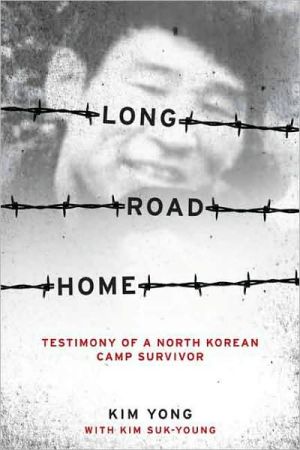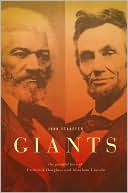Long Road Home: Testimony of a North Korean Camp Survivor
Kim Yong shares his harrowing account of life in a labor camp—a singularly despairing form of torture carried out by the secret state. Although it is known that gulags exist in North Korea, little information is available about their organization and conduct, for prisoners rarely escape both incarceration and the country alive. Long Road Home shares the remarkable story of one such survivor, a former military official who spent six years in a gulag and experienced firsthand the brutality of...
Search in google:
Kim Yong shares his harrowing account of life in a labor camp-a singularly despairing form of torture carried out by the secret state. Although it is known that gulags exist in North Korea, little information is available about their organization and conduct, for prisoners rarely escape both incarceration and the country alive. Long Road Home shares the remarkable story of one such survivor, a former military official who spent six years in a gulag and experienced firsthand the brutality of an unconscionable regime. As a lieutenant colonel in the North Korean army, Kim Yong enjoyed unprecedented privilege in a society that closely monitored its citizens. He owned an imported car and drove it freely throughout the country. He also encountered corruption at all levels, whether among party officials or Japanese trade partners, and took note of the illicit benefits that were awarded to some and cruelly denied to others. When accusations of treason stripped Kim Yong of his position, the loose distinction between those who prosper and those who suffer under Kim Jong-il became painfully clear. Kim Yong was thrown into a world of violence and terror, condemned to camp No. 14 in Hamkyeong province, North Korea's most notorious labor camp. As he worked a constant shift 2,400 feet underground, daylight became Kim's new luxury; as the months wore on, he became intimately acquainted with political prisoners, subhuman camp guards, and an apocalyptic famine that killed millions. After years of meticulous planning, and with the help of old friends, Kim escaped and came to the United States via China, Mongolia, and South Korea. Presented here for the first time in its entirety,his story not only testifies to the atrocities being committed behind North Korea's wall of silence, but it also illuminates the daily struggle to maintain dignity and integrity in the face of unbelievable odds. Like the work of Solzhenitsyn, this rare portrait tells a story of resilience as it reveals the dark forms of oppression, torture, and ideological terror at work in our world today. Kirkus Reviews A rare, chilling glimpse inside the totalitarian regime of North Korea. Kim's tragic tale of his six-year imprisonment and death-defying escape was transcribed and translated by Suk-Young (Theater and Dance/Univ. of California, Santa Barbara), who met the author at a human-rights conference at Cornell University in 2004. Gracefully recounted without embellishment, Kim's story is an example of the profound inhumanity and absurdity of the Communist dictatorship of Kim Il-sung and son Kim Jong-il. Born in 1950, Kim was sent to an orphanage in Pyongyang and was eventually adopted, at age nine, by a powerful couple in the Korean Workers' Party who eagerly answered the call by the Great Leader to shelter the orphans of the civil war. Only much later, after distinguishing himself in military school and as a trader in foreign currency, did Kim learn that his real mother had purposefully placed him in the orphanage to disguise the fact that Kim's father had been executed as a spy for the Americans during the Korean War. A routine check of his background for promotion revealed the truth of his parentage, and Kim, despite his exemplary career and lifelong loyalty to his country, was hauled away from his wife and children in 1993. He was incarcerated in the slave-labor coal mines of Camp Nos. 14 and 18, within the kwanliso system that housed thousands of prisoners in secluded areas of North Korea. Slow starvation, hard labor and extreme conditions meant certain death. Realizing that he had nothing to lose, he escaped by hiding in one of the coal cars on the train heading north. The tales of his subsequent perilous journey to the Chinese border and flight to Mongolia are astonishing. Thanks to Kim'scourageous testimony, as the translator notes in an excellent contextual introduction, knowledge of these camps has been exposed to the outside world.
PrefaceIntroductionTranslator's Note1. Coming of Age2. Living for the Great Leader3. Downfall of a Model Citizen4. In the Mouth of Death5. Escape6. Across the ContinentAfterword: Unfinished StoryNotes
\ Financial Times - Christian Oliver\ Kim gives us a marvellously unsympathetic portrait of a brain-washed apparatchik.\ \ \ \ \ \ Japan Times - Donald Richie\ [Kim's] dispassionate account of how one man endured the unendurable offers a clue as to how such extreme inhumanity can occur.\ \ \ \ Korean QuarterlyA reminder of the brutality of the North Korean regime.\ \ \ \ \ \ Financial TimesKim gives us a marvellously unsympathetic portrait of a brain-washed apparatchik.\ — Christian Oliver\ \ \ \ \ \ Japan Times[Kim's] dispassionate account of how one man endured the unendurable offers a clue as to how such extreme inhumanity can occur.\ — Donald Richie\ \ \ \ \ \ Korean QuarterlyA reminder of the brutality of the North Korean regime.\ — John Feffer\ \ \ \ \ \ Kirkus ReviewsA rare, chilling glimpse inside the totalitarian regime of North Korea. Kim's tragic tale of his six-year imprisonment and death-defying escape was transcribed and translated by Suk-Young (Theater and Dance/Univ. of California, Santa Barbara), who met the author at a human-rights conference at Cornell University in 2004. Gracefully recounted without embellishment, Kim's story is an example of the profound inhumanity and absurdity of the Communist dictatorship of Kim Il-sung and son Kim Jong-il. Born in 1950, Kim was sent to an orphanage in Pyongyang and was eventually adopted, at age nine, by a powerful couple in the Korean Workers' Party who eagerly answered the call by the Great Leader to shelter the orphans of the civil war. Only much later, after distinguishing himself in military school and as a trader in foreign currency, did Kim learn that his real mother had purposefully placed him in the orphanage to disguise the fact that Kim's father had been executed as a spy for the Americans during the Korean War. A routine check of his background for promotion revealed the truth of his parentage, and Kim, despite his exemplary career and lifelong loyalty to his country, was hauled away from his wife and children in 1993. He was incarcerated in the slave-labor coal mines of Camp Nos. 14 and 18, within the kwanliso system that housed thousands of prisoners in secluded areas of North Korea. Slow starvation, hard labor and extreme conditions meant certain death. Realizing that he had nothing to lose, he escaped by hiding in one of the coal cars on the train heading north. The tales of his subsequent perilous journey to the Chinese border and flight to Mongolia are astonishing. Thanks to Kim'scourageous testimony, as the translator notes in an excellent contextual introduction, knowledge of these camps has been exposed to the outside world.\ \








